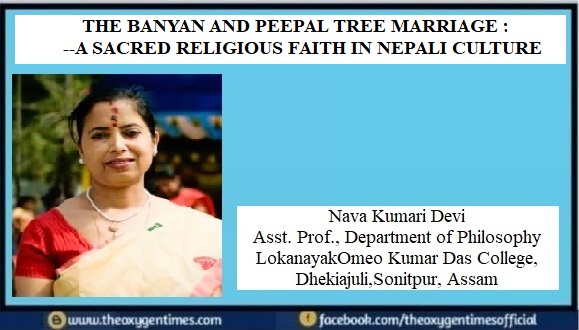
THE BANYAN AND PEEPAL TREE MARRIAGE : -- A SACRED RELIGIOUS FAITH IN NEPALI CULTURE
THE BANYAN AND PEEPAL TREE MARRIAGE :
--A SACRED RELIGIOUS FAITH IN NEPALI CULTURE
Nava Kumari Devi
Asst. Professor, Department of Philosophy,
Lokanayak Omeo Kumar Das College, Dhekiajuli, Sonitpur, Assam
E-mail: navakumari18@gmail.com
INTRODUCTION
This article delves into the topic from the perspective of the philosophy of religion. The real history of humanity is intertwined with the history of religion. As Brightman states, "Philosophy of Religion is an attempt to discover, by rational interpretation of religion and its relations to other types of experience, the truth of religious beliefs and the value of religious attitudes and practices." In religion, people exhibit complete faith in supernatural powers and surrender themselves entirely. Whether seeking something worldly or otherworldly, or simply for the sake of well-being, individuals place their trust in a supreme entity. Humans are considered the most superior beings among all creatures. Thus, in the context of religious beliefs, it is reason and intellect that lead humans to place their faith in the deities they worship.
On the belief of nature worship, the Nepali community celebrates the marriage ceremony of the Banyan and Peepal trees, with the Banyan tree representing God Vishnu as the groom and the Peepal tree representing Goddess Lakshmi as the bride. The Nepali community believes that the Banyan tree symbolizes longevity and immortality because it continues to thrive around anything in its path. It has the ability to live and grow for centuries. Incorporating the qualities of the Banyan tree into our lives serves as a constant reminder of what is truly important. On the other hand, the Nepali community believes that the roots of the Peepal tree house Lord Vishnu, its trunk embodies Keshava, its branches hold Narayana, its leaves are home to Lord Hari, and its fruits are said to contain all the deities. The Peepal tree is considered the form of Lord Vishnu. The wise and virtuous serve this tree, and it is believed to destroy human sins. Additionally, the Peepal tree is believed to be the dwelling place of ancestors and sacred pilgrimage sites.
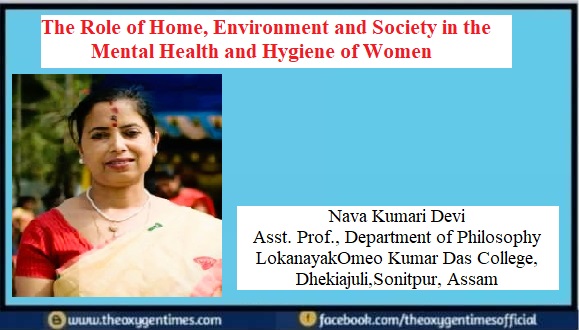
The Role of Home, Environment, and Society in the Mental Health and Hygiene of Women
Nava Kumari Devi,
Assistant Professor, Department of Philosophy
LokanayakOmeo Kumar Das College, Dhekiajuli,Sonitpur, Assam
Introduction:
In this world, a woman is both a mother and the creator of life. Whether educated or uneducated, employed or self-employed, a daily wage earner or a homemaker — every woman is a mother and the key person who efficiently manages her home. For a woman, home comes first, and her profession or workplace comes second.The mental and physical well-being of every woman on this earth depends largely on her home, the financial condition of the household, the environment of the family and society, as well as the pressures, obligations, and forms of exploitation she may face.The concept of mental well-being is dynamic and complex, and it varies among different groups. There are several aspects of women's differences from men's that together influence their mental health (Matud et al., 2019).
Hence, a healthy and harmonious home environment plays a crucial role in shaping a woman’s mental and emotional well-being. A woman’s role in the household does not depend merely on her personal likes or dislikes; rather, by performing her duties and responsibilities with understanding, intelligence, and dedication, she contributes to maintaining peace, order, and balance within the home. This in turn creates an atmosphere that supports the well-being and productivity of all family members.A man may provide all the necessary materials for a home, but it is the woman who, through her thoughtful and creative use of them, transforms a house into a beautiful and harmonious home. A woman is the giver of life, the nurturer of her children, their first teacher, and the shaper of their future. Moreover, with her innate tenderness and compassion, she not only nurtures her family but also contributes to building a healthy and peaceful society.
Healthy mental, physical, and academic growth in children depends on positive intra-parental relationships, parents' personality traits, and caring parental care in the home (Deb et al., 2015).However, a woman’s mental stability and physical health are closely linked to several factors — the availability of daily necessities, the financial condition of the family, access to proper nutrition, emotional support from family members, assistance from those she works with, mutual understanding among household members, and a healthy environment at home. Women's daily life and long-term health are greatly impacted by their psychological well-being (Srivastava K, 2012). Their psychological health is greatly impacted by cultural expectations and roles during marriage and parenthood, as well as pressures associated with education and careers during youth (Herrera et al., 2024).
When a woman’s mind is strong and her environment supportive, she can engage meaningfully in social work and contribute actively to the progress of society.From ancient times, brave, intelligent, creative, and determined women have fought against oppression and have worked for the welfare of their families, communities, nations, and the world. Their contributions have made them immortal in history, their stories recorded in books and traditions across ages.
This paper highlights the importance of women’s mental and physical well-being, along with examples of remarkable women — from the Vedic age to the present day — who, through their determination and resilience, have made significant contributions in various fields. Among them are Gargi, Maitreyi, Apala, Valentina Tereshkova, Sunita Williams, Sati Joymati, Kalpana Chawla, Marie Curie, Kanaklata, Mula Gabharu, AideuHandique, Rani Lakshmi Bai of Jhansi, Mother Teresa, The Mother (Sri Aurobindo Ashram), Rajbala Das, Dr. Mamoni Raisom Goswami, Mary Kom, Lata Mangeshkar, Bachendri Pal, Junko Tabei, and Maria Corina Machado, among others.Today, women are excelling as Presidents, Chief Ministers, Finance Ministers, journalists, editors, athletes, and Nobel Peace Prize laureates. Therefore, merely thinking about women’s health and mental well-being in isolation is not enough.Women must consciously strive, with courage and determination, to create for themselves a positive environment and a balanced state of mind within their homes, so that they can freely and confidently contribute to society, the nation, and the world. By doing so, women become role models who not only strengthen themselves but also inspire and uplift others.
This paper seeks to explore how women can develop a healthy mind and body, and how through their well-being, they can promote the overall welfare of family, society, and humanity as a whole.
.
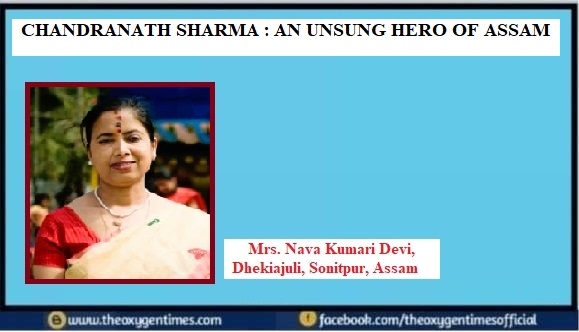
CHANDRANATH SHARMA- AN UNSUNG HERO OF ASSAM
CHANDRANATH SHARMA- AN UNSUNG HERO OF ASSAM
Chandranath Sarmah was born on December 9, 1889, into a farming family near Mekon in the Bihaguri Mauza of Sonitpur District. He was the third child of Dandi Nath Sarma and Kaushalya Devi. Sarmah made significant contributions to literature, the spread of education, and, most notably, the Indian freedom movement. His efforts in the struggle for Independence placed him alongside prominent figures such as Nabin Chandra Bordoloi, Kuladhar Chaliha, Gopinath Bordoloi, and Tarun Ram Phookun. Through his powerful speeches, Chandranath inspired the people of Assam to rise in support of the freedom cause. He was a pioneer in boycotting the legal profession in Assam, a step that was later followed by other key freedom fighters like Gopinath Bordoloi, Nabin Chandra Bordoloi, Kuladhar Chaliha and Tarun Ram Phookun. Due to his simple lifestyle and strong ethical principles, he earned the title of 'Asomiya Gandhi' from the people of Assam. Chandranath Sarmah played a crucial role in bringing Mahatma Gandhi to Assam for the first time in 1921. Gandhi visited Guwahati on August 18 and Tezpur on August 21, thanks to Sarmah’s efforts. A dedicated and selfless individual, Sarmah devoted his life to the welfare of his country and its people. In addition to his role in the freedom movement, Chandranath Sarmah was the chief organizer of significant national events, including the founding of the Assam Chhatra Sammelan and the Assam Sahitya Sabha, further cementing his legacy as a key figure in both the literature and political spheres of Assam.

मेरी 'सानु' सित : With my ‘Sanu’
मेरी 'सानु' सित : With my ‘Sanu’
Sanu!
Today too I returned home without bringing a story.
At the market,
There is no magical country No province of the fairies.
There aren’t any princes coming on horses-elephants back
There aren’t any pigeons & birds flying singing songs
To hold your imaginary village
This world is too narrow Sanu
Today too I returned empty without carrying a story
In the market but there are
-Standing over the industrious heart Lazy sleepiness.
-In the interiorized hearts
The brightness of kerosene lamp
Nearby

अनुहारको कुहिरोसित : With the mist of face
Again for a while
Let’s talk of mountains, hills and the beautiful rivers.
For a while
In the ever-changing colours of sky
Let the face drench
For a while
Of us having left and walked from the village
Again for a while
Let’s talk of mountains, hills and the beautiful rivers.
For a while
In the ever-changing colours of sky
Let the face drench
For a while
Of us having left and walked from the village

Singri – ‘A Paradise for Every Traveler’
Singri – ‘A Paradise for Every Traveler’
Singri - A Place of Traveler’s Paradise for its spiritual charm and diverse landscapes.
Best Time to Visit: 12 Months of the year. (Should be avoided the Rainy Seasons of June, July and August)
Local Language: Assamese, Nepali, Bengali
Major Attractions: Gupteswar Temple, Sacred Seat ‘Dhunighar’, Ruins of Biswakarma Temple, Sildubi –Kalibil, Haragauri Temple, Laxmi Narayan Temple, Archaeological Sites, Singri Tea Estate and Tea Plantation, Bhangamandir, Pilgrim site of Bhutias, Pre Independence Railway Bridge/ Track, Picnic Spots, Maha Sivaratri Festival, Bala Chaturdashi, Bole-Bom.
Why should you visit Singri…………………………. It is a place where you can not only attain travel Nirvana but also spiritual Nirvana.
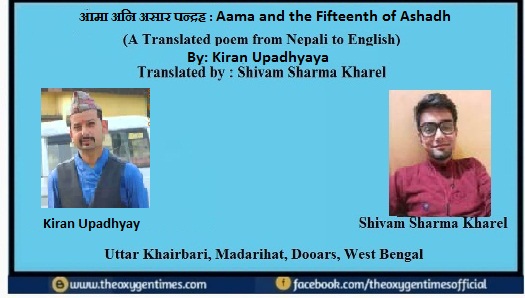
आमा अनि असार पन्द्रह : Aama and the Fifteenth of Ashadh
आमा अनि असार पन्द्रह : Aama and the Fifteenth of Ashadh
By -Kiran Upadhyay
Translated by-Shivam Sharma Kharel
Aama these days doesn’t set the curd
And doesn’t offer rice flakes with curd to anyone
The curd set by Aama’s hand,
The delight of rice flakes with curd every fifteenth of Asadh
And the joy of that moment
Let it never come to an end!
Eating a pound to sprout a ton
Is the month of Ashadh, and
The self-sufficient us,
Would never be pressed down by the market those days!
Moreover today
Eating rice flakes with curd
Compulsorily playing mud and planting paddy
Till its completion is celebrated!
At that time for us
It used to be a huge carnival
The heart always used to say in childhood
When to become a hugely successful person
And to earn a lot of money!
The same heart says today
Let I be a child again!
May I get that boundless joy and pleasure all over again!

One Day एकदिन
One Day एकदिन
--By Geeta Tripathee
Translated by Sri Shivan Sharma Kharal
One Day
One Day
He
Resolved to build a massive house
Of his bravery
Of his nature
Of his own model
A historic house.
Keeping a golden statue
Worshiping it.

A Living Bridge in the Field of Culture and Literature of Assam: Prof. Geeta Upadhyay
A Living Bridge in the Field of Culture and Literature of Assam: Prof. Geeta Upadhyay
Dr. Dhundi Raj Upadhyaya (Raj) Gamiripal, Jamugurihat , Sonitpur (Assam)
From the beginning of mankind, woman occupies a vital role in the whole spheres of life. The first component of our society is home and where woman plays a great role as a mother and she is the first preceptor of her child. A woman plays an important role not only in building a society but in the well establishment of culture and literature too. The tradition of our nation has been placing a woman in a great position from the ancient to till date, because of her relinquishment and active involvement in our society. The life of a human begins from her/his home, where the mother plays a significant role in upbringing her child. There is no doubt that a mother is the first and the best Guru of a child. So, Maharshi (Sage) Manu says that, our culture and tradition places the mother before the father and a teacher, i.e., उपाध्यायान्दशाचार्य आचार्याणां शतं पिता । सहस्रं तु पितृन्माता गौरवेणातिरिच्यते।। Manusmṛti 2.145

धुवाँहरुको म्याराथन जुलुस - The Marathon Rally of Smokes'
The Marathon Rally of Smokes'
Uttar Khairbari, Madarihat, Dooars, West Bengal
I am seeing a rally of smokes’
Covering the sky itself
They are speeding fast
And draping us in black shadows
By the foul smell of human flesh
And
The cries of humans
The floor is weeping silently
Indistinctly weeping
Is humankind!
Those who enter the Parliament
Today having entered in every tiny bit
Have hollowed it all
The country
And us!!
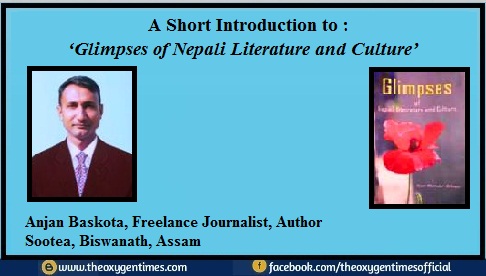
A Short Introduction to : ‘Glimpses of Nepali Literature and Culture’
A Short Introduction to : ‘Glimpses of Nepali Literature and Culture’
Anjan Baskota, Freelance Journalist, Author, Sootea, Biswanath, Assam
Introduction:
Title of the book: Glimpses of Nepali Literature and Culture
Name of the author: Gyan Bahadur Chhetry
Name of the Publisher: Oriental Publication Pvt. Ltd, Kathmandu
Edition: 2020 (First)
Price: 250 INR.
Genre: Critical Essays (in English)
About the author:
Gyan Bahadur Chhetry is a prominent critic from Tezpur, Assam. He has many books to his credit. They include Avalokan (Nepali 2016, criticism), Sahitya Akademi Puraskar Vijeta Nepali Sahityakar (Nepali, 2000), Sarjak Ra Srijana (Nepali, 2010, criticism), Sagarmathako Deshma (Nepali, 2018), Nepali Sahityat Ebhumuki (Assamese, 2010), Phulam Gamocha Aru Anyanya Rachana (Assamese, 2016). G.B.Chhetry is a prolific writer who has equal reach in English, Assamese, Nepali and in Hindi languages. He has already served as an advisory member of the Nepali language for Sahitya Akademi for two consecutive terms. A recipient of Sahitya Akademi translation award for his translation work ‘Khoji’ in 2016. Sri Chhetry is a known translator. His translation works cover Manpareka Katha (Nepali, 2003), MailoChadar (Nepali, 2010), Khoji (Nepali, 2010). And Glimpses of Nepali Literature and Culture is his first published book in the English language.

Unexpected female child as a factor of population growth
Unexpected female child :
as a factor of population growth
Dr. Chavan Kumar Sarmah
Assistant Professor, Department of Statistics,
B.H. College, Howly, Barpeta, Assam, India
E-Mail: sarmahchavan@rediffmail.com.
“The power of population is indefinitely greater than the power of earth to produce subsistence for the man as the population is growing geometrically while the resources to support it are growing arithmetically”. - Thomas Robert Malthus.
Rising population in our country was once considered to be an asset when there was a need for more hands to take part in various fields. But this boon has now turned out to be a bane because the country’s population has touched the danger mark. Population grows as a result of reproductive activity and hence females are the actual proprietor of a new birth. Every moment additions are being made to the population by new births and each year’s addition to Indian population is equal to the entire population of Australia.

Assam and the Nepalese in Assam
Assam and the Nepalese in Assam
Dr. Chavan Kr. Sarmah
Assistant Professor, B.H. College, Howly, Barpeta
Assam is one of the beautiful and attractive tourist and settlement destinations of the nation. The state of Assam is rich in its natural beauty, resources and in the ethnic cultural diversities. Varieties of ethnic communities, integrated cultural and religious diversities are the essence of the beautifulness of the state. Nepalese also known as Gorkhali or Gorkhas is one of the largest and most colorful ethnic communities of the state Assam. It is a very diverse community that includes people of Aryan, Mongolian and Tibetan origin. There are number of sub-communities namely Brahmans, Chetry, Rai, Limbo, Newar, Magar, Sherpa, Gurungs, Tamang, Kami, Domai, Dhami etc. which have distinct culture, customs and different languages but they all identify themselves as Nepali or Gorkhali and speak Nepali language. Though the Nepalese speak Nepali a language of Indo-Aryan family they use Assamese as a lingua franca.

THOSE GOLDEN DAYS
THOSE GOLDEN DAYS
“We don't remember days, we remember moments.” --Cesare Paverse.
Debashree Konwar, Class:X
Saint Francis De Sales School,
Dhemaji, Assam
Some experiences are worth having in life. They make us realize that life indeed is dynamic and vibrant. National Children Science Congress 2019 was such an incredible expedition form. Written in those are the stories, words can never fully explain. The 10 days schedule started on 21st December 2019, when I arrived Guwahati. The initial days were spent on rigorous mentoring sessions and in getting to know my teammates better. Due to certain inconveniences we had to stay in Guwahati for 2 days more.

Education, Result, Job and Life
Education, Result, Job and Life
Chintamoni Chamlagain
Laimekuri HSSchool
Laimekuri, Dhemaji, Assam
Rainy season in India is the season of school results too. It is in this season that the results of two important examinations, namely classes ten and twelve, that pave the careers of students, are declared. Students are flamboyant and thrilled to step in a new institution for higher education in a new atmosphere after the results and the parents are exuberant either. T.V. screens display the jubilant countenance of promising students. They fill news paper pages; columnists pen down analytical essays in series on youngsters and education, the role of parents, teachers and the society in children's learning. Institutions celebrate their students' victory with pomp and circumstance. Parents begin nurturing their expectations more vigorously and add new dimension to their dreams. Admission counters of colleges are thronged with busy huge congregation and floors are bustled with rat-races. There's comfort in commotions everywhere. Successful candidates are much talked about. Unsuccessful children, on the other hand, are lost in oblivion, ignored and uncared. The society forgets to realize that the results of mere an examination can neither determine the fate of a student nor can it be a measuring rod to gauge the genius of a student.

THE ACCIDENT
THE ACCIDENT
Chintamoni Chamlagain
Laimekuri HSSchool
Laimekuri, Dhemaji, Assam
It was 12th November, 2020. The time was twelve (noon). A plan to go to Dibrugarh that day had already been made. But I didn't want to miss my classes either. So I accomplished my duty in early hours and freed myself for the day. After my class I drove back home with a halt at Simen Chapori for 10 to 15 minutes to sip a cup of coffee (an activity turning into a habit of late) at the bakery-cum-coffee house. There was plenty of time in my hand as we were supposed to set out to Dibrugarh after 1:30 and it would take only half an hour for me to reach home (Silapathar) even if I drove at 60km/h.

समय चक्र Time Cycle
समय चक्र Time Cycle
(A Translated poem from Nepali to English)
Original by : Bilok Sharma
Translated by : Shivam Sharma Kharel

MARTYR OF THE SOIL: MANBAR NATH
Dr. Hari Prasad Baruah
Mrs Kalpana Agarwala Baruah
Dhekiajuli, Sonitpur, Assam
"These deaths, injuries, humiliations and atrocities are the price of liberty, a price a country is asked to pay for its desire to be free. Our people know that and therefore they are determined as never before to do or die. Untold miseries may be heaped on our people but the caravan of India goes on to its destined goal -independence full and undiluted."
- GOPINATH BARDOLOI

An introduction to ‘Puratan Prabha’
Anjan Baskota
Sootea, Biswanath, Assam, India
Introduction:
Name of the Book: Puratan Prabha
Name of the author: Dr. Dhundi Raj Upadhyaya
Name of the publisher: Bagamrit Sanskrit Sahitya Samiti
Genre: Article collection in Nepali
Year of publication: 2020
Available: May contact: 91-8638082147.
About the author:
Dr. Dhundiraj Upadhyaya was born on December 12, 1987 at Gamiripal; Jamugurihat under Sonitpur district of Assam. He is the youngest son of Late Khemraj Upadhyaya and Buddhimati Devi. He has started his literary carrier with publication of Nepali one act drama collection ‘Yatra’ in 2008. Dr. Dhundiraj has published five books so far namely ‘Sath Bibhuti’ (collection of essays in English, 2014), ‘Mishrabatika’ (collection of multilingual essays, 2015), ‘Madhuram’ (collection of multilingual essays, 2017), ‘Basundhara Tum Ho Ananya’ (collection of translated Hindi poems, 2019). Dr. Upadhyaya has edited various research based magazines and journals till the date. His well-known edited magazines include ‘Gyandarshika’, ‘Pragya’, ‘Bagamrit’, ‘Baibhav’ etc. Dr. Dhundi is a multilingual writer who writes equally in English, Hindi, Sanskrit, Nepali and Assamese language. He was conferred PhD degree by the Assam University; Silchar for his thesis ‘Student code of conduct in Smriti literature with special reference to the Manusamhita: Contemporary relevance’ in 2017.

Looking for Oxygen
We are presently living in a critical world. The whole earth seems to be pale with jaundiced look and is hankering after comfort which looks rare.
Yes, we are talking about our ailing planet. Earth is now gradually transformed into a garbage dumping ground where inferior things are dumped everyday without taking or caring others concerns. We look like plastic men, since morning till night, we can't think of doing our tasks without touching plastics and polythenes.